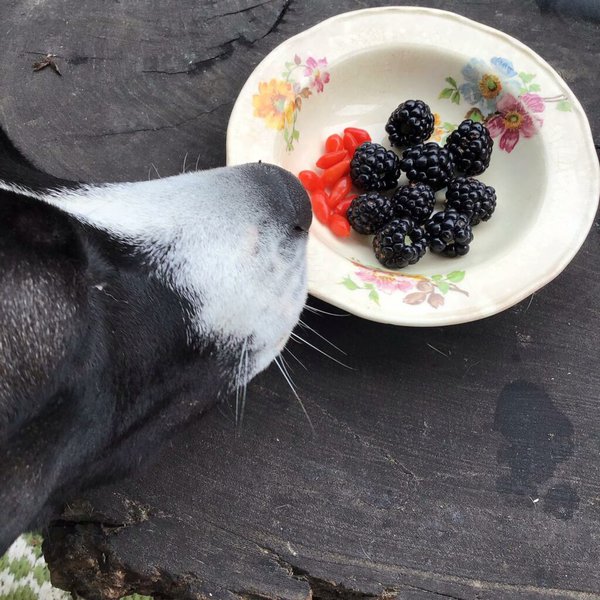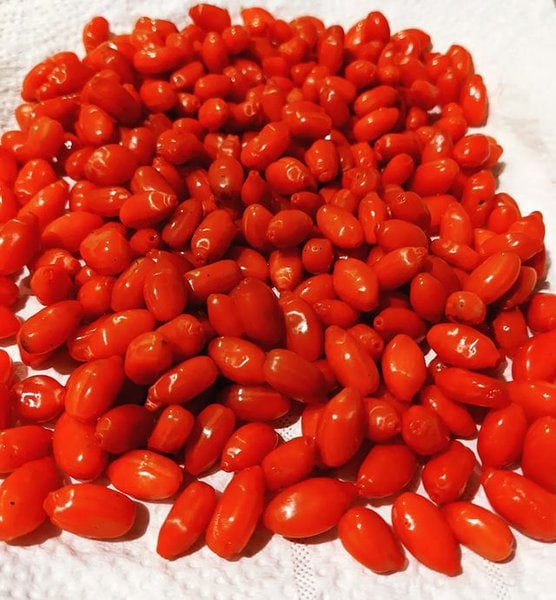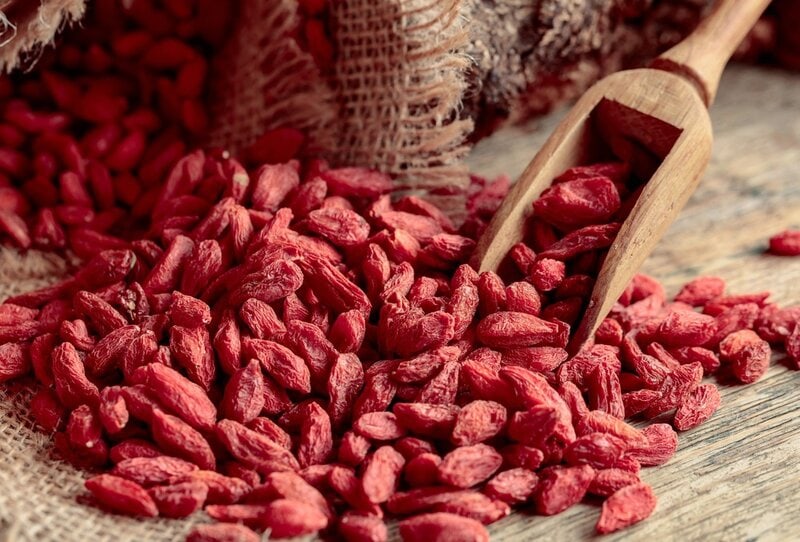There is a bit of controversy over giving goji berries to dogs. Some dog owners are reluctant to give goji berries to their canines due to the high sugar content. They worry goji berries would make their dogs diabetic and obese. So, can dogs eat goji berries? Is it safe for them?
Yes, dogs can eat goji berries as it is safe for them. Goji berries contain essential nutrients and antioxidants. They are known to strengthen the immune systems of dogs if given in the right amount moderately.
One of the outstanding benefits of goji berries for dogs is the high amount of essential vitamins they contain. When given properly, goji berries improve a dog’s muscle and nerve health. To find out more about the benefits of goji berries for your pooch, we urge you to keep reading this article.
Before discussing the benefits of goji berries for dogs, let’s talk about how much goji berries are safe for canines.
How Much Goji Berries Can I Give My Dog?

On average, experts recommend giving about eight goji berries a couple of times a week to your dog. The number of goji berries you give to your dog should depend on its weight.
Goji berries contain a high amount of sugar. Hence, giving an excessive amount to your pooch will be detrimental to its health.
As a rule of thumb, treats and snacks should not be more than 10% of your dog’s daily treats. Due to the high amount of sugar in goji berries, it should be far less than 10%.
If you offer too many goji berries to your canine, it will result in diarrhea and loose stool. If you are giving goji berries to your dog for the first time, introduce them slowly to prevent stomach upset.
How Do I Feed My Dog Goji Berries?
If the goji berries are dry, soften the berries by soaking them in water before giving them to your dog. Another option is to mix the berries with your dog’s food.
The main essence of soaking goji berries in water is to allow easy passage through the digestive system of your canine. Dried goji berries can be harmful to your pooch.
The good thing is that dogs can consume goji berries the same way humans would. However, exercise caution because goji berries do come with stems, and not removing the stems before feeding them to your dog can pose a choking risk.
To make your canine eat goji berries, hide them in your dog’s favorite treats!
Can Dogs Eat Raw Goji Berries?
Yes, dogs can eat raw goji berries. Goji berries are packed with a lot of vitamins and antioxidants both in raw and cooked form.
Before feeding goji berries to your canine, speak with your vet. Your vet would give you the necessary information on the right amount of goji berries to give to your canine.
When it comes to feeding goji berries to your dog, there are two options; dried or fresh berries. They both have their pros and cons.
Fresh goji berries are more refreshing to dogs due to the high moisture content, whereas dried ones are more delicious as they tend to lock in more flavor. Dried goji berries can be kept for long periods.
Always remember that goji berries are not meant to be fed to dogs every day. Give your dogs goji berries only once in a while.
What Are The Side Effects Of Goji Berries For Dogs?

Goji berries aren’t toxic to dogs, but some dogs develop allergic reactions to them. Common side effects of goji berries seen in some dogs include:
- Hives
- Itching
- Indigestion
- Facial swelling
Apart from the above side effects seen in some dogs, goji berries are known to interact with certain medications.
If your canine is on any medications, speak with your vet before giving goji berries to your dog.
Goji berries interact with medications used in treating hypertension, diabetes, and pulmonary thromboembolism in dogs.
Can Goji Berries Cause Diarrhea For Dogs?
Yes. Goji berries cause diarrhea and loose stool for dogs if too many are given at once to them.
Exercise caution when giving goji berries to your dog. Like many other fruits, excess amounts cause diarrhea for canines.
You should also refrain from giving goji berries to your dog if it is having bouts of diarrhea. Goji berries will only aggravate diarrhea.
Why Are Goji Berries Dried?
Goji berries are dried to prevent quick spoilage. Due to the high moisture content, goji berries perish easily. They get easily damaged in the course of transporting them.
Most goji berries are cultivated in northern China. These berries are often sun-dried to preserve them from damage before transporting them over long distances.
Goji berries are now being cultivated in the US, and the odds of buying fresh goji berries in stores are currently high, unlike in the past.
Before serving your canine with dried goji berries, do well to rehydrate them. Dogs find it unpleasant to eat dry berries because of their hard texture.
To rehydrate goji berries before serving your dog, all you need to do is to soak them in water for about 2 hours.
Do Goji Berries Cause Inflammation?
Yes. Goji berries are known to cause inflammation in dogs with autoimmune conditions. Asides from this, goji berries are packed with a lot of essential nutrients.
Goji berries belong to the nightshade family. Nightshade is known to increase inflammation in both dogs and humans with autoimmune conditions.
For example, if your canine suffers from rheumatoid arthritis, an autoimmune disorder, refrain from giving it goji berries.
What Are The Benefits Of Goji Berries To Dogs?
Goji berries are fully packed with essential nutrients such as carotenoids, lycopene, antioxidants, and polysaccharides. These nutrients help your canine stay healthy.
The nutritional value of goji berries depends on various factors. The factors include the following:
- Type
- Processing
- Freshness
Goji berry is one of the best berries you can offer to your dog. For example, goji berries contain the same level of vitamin C found in oranges.
Apart from the above, goji berries have high amounts of fiber and protein. One hundred grams of goji berries contain about 11 grams of protein compared to 1 gram of protein found in raspberries.
Antioxidants
Goji berries are an excellent source of antioxidants. Antioxidants help to fight free radicals that have built up in your canine.
Goji berries have a high Oxygen Radical Absorbance Capacity (ORAC) score. It has a score of 3,290. ORAC score is used to determine the level of antioxidants in food.
Furthermore, antioxidants found in goji berries help slow down the aging process in elderly dogs. It also boosts immune health in general.
Calcium
For your dog to have strong and healthy bones, it needs calcium. Goji berries are an excellent source of calcium.
Calcium is also known to improve the dental health of dogs. Giving your dog goji berries will help lower the risk of a bone disease called rickets.
Rickets is commonly found in humans and dogs. It causes bones to become brittle. A dog with rickets will likely experience stunted growth.

Iron
Goji berries are an excellent source of iron. If your dog is anemic, you should consider giving it some goji berries.
Iron is a crucial mineral that helps in the production and transport of red blood cells in dogs. Without enough iron, dogs will suddenly turn anemic.
Selenium
Selenium is another mineral that is richly found in goji berries. Selenium slows down the aging of cells by oxidation.
Selenium helps prevent some disorders common to dogs, such as inflammatory bowel disease, skin disorders, and heart disease.
In addition, the high fiber content in goji berries helps dogs with arthritis. Older dogs benefit a lot from goji berries.
Can I Give My Dog Goji Berries Every Day?
No, please do not give goji berries to your dog every day. Once again, goji berries should only be taken in moderation, perhaps a couple of times a week.
Eating the same snack or treats every time can become boring to your dog. Instead of giving goji berries every time to your canine, look for other beneficial treats.





